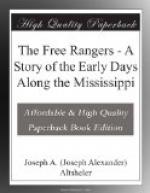“We didn’t have good shelter here,” said Shif’less Sol, “but I think the rain and its coolness have helped Paul.”
Adam Colfax bent over the boy and, in the dawning light, made a critical examination.
“He will live,” he said. “We’d have come to your relief long ago, had we known you were here.”
“It was Braxton Wyatt who led the last attack against us,” said Henry, “and as usual, he has had the good luck to escape. At least, we can’t find his body here, and I haven’t the slightest doubt that he’s living to do more mischief and that we’ll meet him again.”
It was true, and a diligent search revealed no trace of Wyatt. He had escaped, fleeing North after the battle, to rejoin his old friends, the Shawnees and Miamis.
Paul was lifted gently, after receiving treatment from the surgeon of the fleet, and carried to a boat, where he regained consciousness. His wound was severe, but his blood was so healthy that he would recover, according to the surgeon, with great rapidity.
When all five were together, Adam Colfax said to them collectively:
“You did the most of all to save the fleet.”
That was enough reward for them.
The body of Father Montigny was buried in the forest, and a little wooden cross was put at his head, Christian burial was given to the body of Alvarez, too, and the supply fleet prepared for a new start.
* * * * *
The fleet, two weeks later, was making its slow progress northward on the Mississippi. The great river was in an uncommonly friendly mood. Its usual yellow seemed silver in the brilliant morning light. Heavy masses of green fringed either low shore, and keen pleasant odors came from the wilderness.
Oliver Pollock, hearing of the battle of the bayou, had sent a second detachment from New Orleans to replace the men and boats lost and the ammunition shot away by the first, and now, stronger than ever, it continued under the brave and skillful leadership of Adam Colfax, on its great mission.
The five sat in the end of one of the largest boats, under the shade of a sail. Paul’s strength was fast coming back; he would not suffer the slightest harm, and they were happy.
“This is jest the life fur a lazy man like me,” said Shif’less Sol. “Nothin’ to do but go on an’ on, with people to wait on you, an’ say you hev already done your part.”
“We have had a wonderful escape,” said Paul.
The face of the shiftless one became grave, even reverent.
“So we hev, Paul,” he said. “Seems to me sometimes that we wuz spared fur a purpose. We wouldn’t hev come alive, every one of us, through all that, ef it hadn’t been intended that we should go on with the work that we are doin’, helpin’ and defendin’ our people the best we kin. I think we’ve been chose.”
“I think so, too,” said Paul, “and here and now we should devote ourselves to it, as long as it is needed. I want to do so. Are the rest of you willing?”




